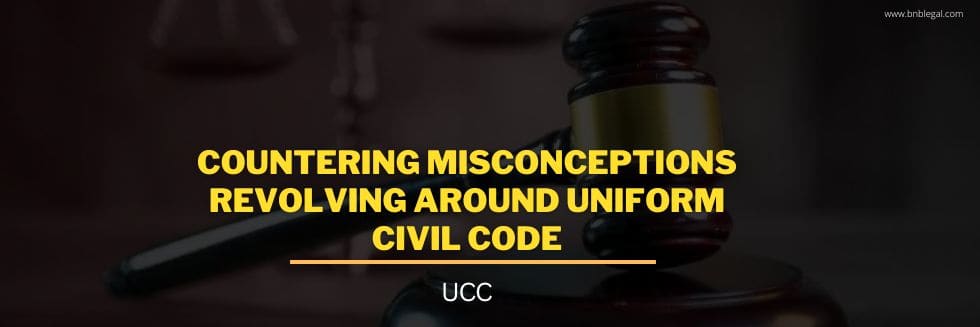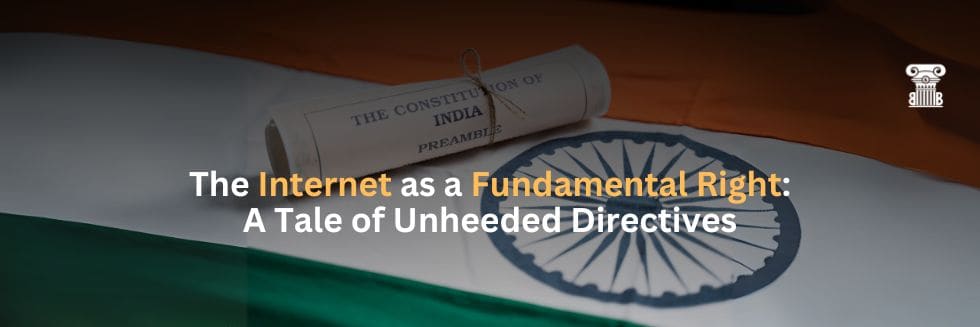Introduction
The Uniform Civil Code (UCC) is a suggested segment of legislation in India which attempts to provide consistent personal laws applicable to all people, irrespective of gender, sexual orientation, or religious affiliation. Personal laws are currently governed by religious texts relevant to distinct communities.
It has been a source of debate in India for many decades, but there is no decision on whether it should be implemented or not. Prime Minister Narendra Modi stated in his recent address in Madhya Pradesh that “India cannot function efficiently with a system of separate laws for separate communities.” This has created a controversy concerning the benefits and drawbacks of the UCC, with many falsehoods & rumours swirling around this.
Chinnappa Reddy, J., observed in Ms. Jordan Diengdeh v. S.S. Chopra, that “the present case is yet another which focuses on the immediate and compulsive need for a uniform civil code.”
Brief History Of Uniform Civil Code In India
- 1835: The British administration in India established a Law Commission to codify the country’s laws. The Law Commission suggested that a UCC should be established, however, this was not done.
- 1937: The Constituent Assembly of India debated the adoption of a UCC, but there was no agreement.
- 1947: Following independence, the Indian government explored instituting a UCC once more. Some religious groups, however, objected, claiming that it would violate their religious freedom.
- 1950: The Indian Constitution’s DPSPs included a provision for a UCC. However, because it was not designated as a Fundamental Right, the government was not required to implement it.
- 1985: The Indian Law Commission suggested the creation of UCC once more but Rajiv Gandhi, the then-Prime Minister, opposed it.
- 2005: The Indian Law Commission again advocated the adoption of UCC. This time, the government established a National Commission for Women to investigate the matter.
- 2016: The National Commission on Women submitted its report on the UCC in 2016. The report proposed the establishment of a UCC, however, this has yet to be implemented.
- 2019: The Law Commission of India released a report to the government advocating the implementation of a UCC. A UCC would, according to the paper, “promote gender equality, protect the rights of women and children, and ensure social justice for all citizens.”
- 2020: The Indian government forms a committee to investigate the Law Commission’s report. The committee’s report is planned to be submitted in 2023.
- 2021: India’s Prime Minister, Narendra Modi, has stated that the administration is dedicated to implementing a UCC. He has, however, stated that the government will consider the views of all stakeholders before reaching a decision.
Why Is The Rajya Sabha Proposing A Uniform Civil Code?
Kirodi Lal Meena, a BJP member, introduced legislation in the upper house to establish a commission to draft a Uniform Civil Code (UCC) to get it implemented throughout the country. This bill was introduced in Rajya Sabha because it provided for the establishment of a national inspection and investigation body in order to develop a standard civil code.
In Smt. Sarla Mudgal, President v. Union of India & Ors., “The Supreme Court slammed the government for failing to take even a single step towards implementing the Uniform Civil Code.”
Why Are Muslims And Other Conservative Organizations Opposing UCC?
In defence of Sharia and other religious practices, Muslim organizations and various orthodox religious groups continue to oppose the Uniform Civil Code. Marriage, divorce, inheritance, adoption, and maintenance are all governed by personal laws. They differ from public laws.
“The Supreme Court judgment in the Shah Bano case is often regarded as a significant milestone in emphasizing the importance of UCC. The woman in this case on being divorced under triple talaq demanded maintenance under Section 125 of CrPC. All the lower courts rule in her favour, so the husband filed an appeal before the Supreme Court, which was dismissed. Furthermore, the court emphasized that a uniform civil code should be adopted.”
Countering Misconceptions Revolving Around UCC
UCC will undermine India’s cultural diversity
Reality: The implementation of a UCC strives to codify existing personal laws and also recognize and protect the various cultural practices and customs of different communities. India is known for its “Unity in Diversity,” which is an adorable part of Indian society, and the adoption of UCC has no intent to undermine it. In fact, it maintains a balance between uniformity of legal principles and preservation of cultural differences, recognizing the prosperity which is derived from India’s unique cultural legacy.
UCC will alter your social status and customs
Reality: UCC is a set of regulations that regardless of a person’s religion, belief or community, governs all personal concerns such as marriage, divorce, inheritance, and adoption. It makes no attempt to change or influence a person’s faith, rituals, or religious customs. The right to practice one’s faith and freedom of religion are fundamental rights guaranteed by the Indian Constitution under Article 25 and are unaffected by the UCC. As a result, UCC will not have any effect on the rites and traditions one has known and followed since childhood.
UCC will be challenging to adopt and enforce
Reality: This is a legitimate worry. UCC would necessitate a substantial shift in how personal problems are currently handled in India. It is, nevertheless, not impossible to implement and enforce. Many countries throughout the world have successfully embraced UCC, and India might benefit from their lessons.
The Indian citizens will not embrace UCC
Reality: This is a challenging question to answer. There is no way of knowing how Indian citizens would react to UCC until it is implemented. However, It is worth mentioning that there is rising support in India for UCC, and many people believe that it is vital to promote equality and justice for all residents.
If enforced, UCC would constitute a violation of Article 25 i.e., Religious Freedom
Reality: The adoption of a Uniform Civil Code (UCC) does not violate the right to religious freedom. The right to religious freedom, as guaranteed by the Indian Constitution allows individuals, the freedom to practice and spread their faith. This right, however, is not absolute and can be subject to reasonable restrictions in order to preserve the rights and interests of all citizens. It is worth noting that Article 44 of the Indian Constitution provides for a Uniform Civil Code, which pushes the state to achieve a UCC for its inhabitants. The concept of a UCC is consistent with the framers’ vision of a harmonious and egalitarian society.
UCC is unjust to minorities and would impose majority laws
Reality: A well-drafted UCC would take into account the cultural and religious sensitivities of all communities. It would not impose a single set of laws geared toward a specific faith on everyone but rather give a shared framework for settling personal concerns fairly and justly.
The UCC violates the Indian Constitution:
Reality: While drafting the Constitution, Dr. B R Ambedkar stated that a UCC was desirable but should remain voluntary until the nation was socially prepared to embrace it. According to Article 44 of the Indian Constitution, “the State shall endeavour to secure for the citizens, a uniform civil code throughout the territory of India.” While India already has a uniform criminal code that applies to all citizens, as well as various uniform statutes such as the Contract Act, the Transfer of Property Act, and the Civil Procedure Code, the Uniform Civil Code mentioned here refers to personal laws governing marriage, divorce, inheritance, and adoption. The main aim is to achieve uniformity in these specific areas.
Conclusion
The Uniform Civil Code (UCC) is a set of proposed personal laws which would apply to all Indian citizens, regardless of religion, caste, or gender. UCC’s mission is to promote gender equality and social justice by ensuring that all citizens are treated fairly under the law.
In India, there are compelling arguments on both sides of the debate revolving around UCC. Some argue that UCC would be a positive step toward achieving equality and fairness for all citizens, while others argue that it would violate religious freedom or be difficult to execute. Finally, the choice to implement UCC is a difficult one that must be made after a thorough analysis of all variables involved.
This article is written and submitted by Sanskar Singhal during his course of internship at B&B Associates LLP. Sanskar is a 5th Year BBA LLB student at Geeta Institute of Law, Panipat.








